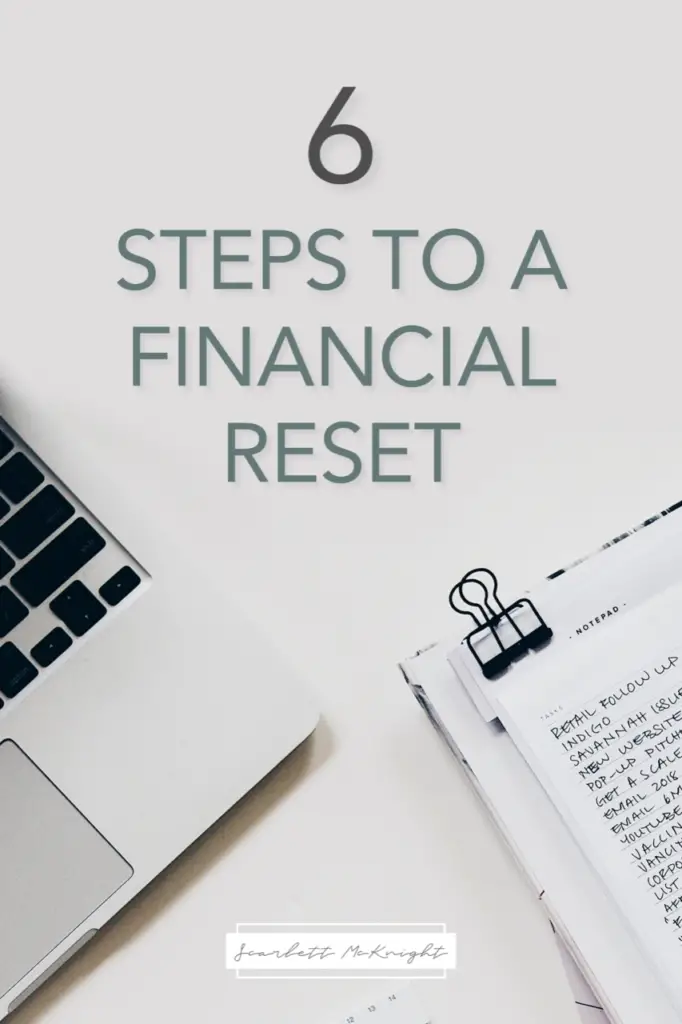Disclosure: This post may contain affiliate links that earn me a small commission, at no additional cost to you! See our disclaimer for details.
6 Steps to a Financial Reset in 2021
It is the beginning of the year and so we need to talk about ways to set up your financial reset for 2021!
A financial reset is restarting your financial journey by taking the necessary steps to understand your financial situation and begin new habits for wealth growth.
Additionally, I’ll go over 6 actionable steps, from start to finish, to guide you through the process!
The 6 steps to a financial reset include:
- Know your credit score
- Learn your net worth
- Build an emergency fund
- Understand your taxes
- Have an accountability partner
- Establish a budget
If you’re new to the idea of debt freedom, or if you are interested in paying off money, this article will help you start your runway to debt freedom and give you the tools that you need to start this journey!
It’s important to reset your financial journey, to get back on track. Have you attempted budgeting or saving money, and weren’t able to stick to it? Do you want to get back into a routine of minimalism or giving?
Let’s start with the first step to getting your finances in order for 2021!

1. Credit Score
The first of these six steps for your financial reset is to know your credit score.
When it comes to your credit score, especially if you want to grow wealth, there are some conflicting messages in the financial community.
Some financial gurus say that it is not that important to worry about your credit score. However, I know that, for being in rental investing, having a good credit score is really important!
Your credit score is made up by 3 different credit rating agencies (Equifax, Experian and TransUnion). Your score will fluctuate a little between each company but will usually be within 10 – 15 points.
My preferred method for finding out a credit score is using Credit Karma! I recommend them because their services are free,and they don’t have to run a credit check on you which can have a short-term negative impact to your credit score!
Sign up is easy and they can display all three of the credit rating agency scores on their site.
If you sign up with them, they’ll also send you alerts when your credit changes. This can be a great motivator as you start to see your score climb this year!
Another way, that takes a little more effort, is to go to each credit agency and request your score.
By law, they are obligated to provide the score to you free of charge one time per year.
2. Net Worth
The second step is to know your net worth!
Taking a step back, when it comes to your credit score, it is more of a snapshot of your financial situation, regarding how much debt you’ve had and your history of paying debt off.
Regarding your net worth, it is essentially a snapshot of your assets and liabilities. As in, it is a dollar amount of both your debts, your cash and investments.
Your net worth is a number of how much money you have to your name!
If you have a lot of debt, like student loans and a car loan for example, you might be in the negatives, and that can sometimes be scary to come to terms with. A lot of people avoid checking their net worth because they know that it’s not a positive number.
I used to have $50,000 of student loan debt, so my number was not positive right out of school! But as you slowly build wealth, you get rid of your debt and it does become a positive number.
Knowing your net worth is pivotal for anyone interested in saving money, paying off debt, or wanting to achieve financial freedom!
I personally check my net worth on a free app (and it’s free online, too!) called Personal Capital.
All you need to do is you enter or link your investment accounts, your bank accounts, and loans to the platorm.
(Do know that Personal Capital is completely secure and encrypted and no one can access your information.)
This has been my favorite way, for years, to stay on track with building wealth and getting out of debt!
3. Emergency Fund
The next step for your financial reset in 2021 is to make sure you have an emergency fund!
If there is one thing that 2020 taught us, it is that you never know what is going to happen next! So many people didn’t have an emergency fund set up, and really struggled financially.
An emergency fund is money specifically set aside that is liquid, meaning you can access it really quickly, that you can use to pay for emergencies.
For example, if there’s a breakdown of your refrigerator or your car needs a sudden repair, you can take money from that account without dipping into your savings, spending on your credit card, or without taking a out loan.
The goal is to first have $1000 in an emergency fund. That is the amount most financial mentors recommend at first. However, once you get that $1000, the goal is to then accumulate three to six months, if not six months to a year, of an emergency fund.
The reason for this is to supplement your ability to support your family if you lost a job or had a long-term medical emergency.
4. Taxes
This is an uncommon recommendation, but I believe it is important to understand and prepare for your taxes ahead of time.
Tax season is a time that stresses many people out. In fact, it is surprising how many people don’t understand their taxes!
To start, I suggest you first look at your pay stubs get an understanding of how much is being taken out. You then can learn the difference between your gross and net income, as in how much you’re earning versus how much you are taking home.
Most pertinent to this year, if you’re someone who started up a side hustle or side business this last year, it is important that you learn about your self employment taxes, or to learn about the taxes that you need to pay quarterly!
There are a lot of tax-related payments that people miss out on because it can be a confusing topic.
Leave yourself with the stress later on and take the time now to better understand your personal income, how much money comes out of taxes, and how to pay for any money you earned in side hustles!
You definitely don’t have to be your own tax accountant. The idea is to simply get a better understanding of your own personal tax situation!
5. Accountability Partner
An accountability partner is someone who you can have either monthly check-ins with, or whom you can meet with every so often to motivate you toward achieving your financial goals!
They keep you accountable for what you’ve stated that you want to do!
For many people, a spouse is an easy option. Or, this can be a close friend or relative.
Trying to create new habits is hard. We all know this. When it comes to New Years Resolutions, most people last a few days, few weeks, and very few make it to a month. The chances that you will maintain your debt-free journey (or building habits toward other goals) is not in your favor.
However, having someone who can mentor you during your financial reset, or simply someone who you reach out to once a month, is a critical factor to your financial success!
6. Budget
The year 2020 was a confusing year, financially. Many people got stimulus checks, others had to find extra jobs, and it was very difficult to predict how the next day would look.
Therefore, this topic on creating a budget is such a critical action to do as soon as possible! However, it is very important to achieve the above steps, in order to property set up a budget and start on this financial reset.
Instead of diving into each detail about how to be a pro at budgeting, here are my favorite articles about this topic!
- 5 Pro Tips for Creating a Lasting Budget
- How to Live on a Budget an Be Happy
- Ultimate Guide to Adding Sinking Funds to Your Budget
Additionally, let’s talk about a few other ways to work toward establishing a budget!
Budget Meetings
I have monthly budgeting meetings with my spouse, and doing these meetings has been transformational! We just sit down in our living room or we go to get coffee, and we discuss how the previous month went, our spending history, and what to expect to pay for in the coming month.
Sinking Funds
One of the best additions to your budget that you can make is having a sinking fund! A sinking fund is money set aside for expected expenses. This is different than an emergency fund, which is money set aside for emergencies (unexpected expenses). For example, I put money in money to my sinking fund to save up for any vacations, birthdays for the year, and even Christmas!
Summary
Getting a solid idea of your current financial situation using these steps will set you apart from most Americans! Although these steps seem simple, I have seen far too many people who have no idea what their credit score is, how much debt they are in, or have never talked about money with their spouse!
Hopefully these steps give you a few ideas of how to begin your financial reset and helps guide you to start working on improving your finances and growing wealth!
Be sure to take advantage of my free budget planner (scroll down to find the sign up!) that you get for joining my email newsletter! I send out emails every two weeks, and include a freebie, printable, or product with every email!

